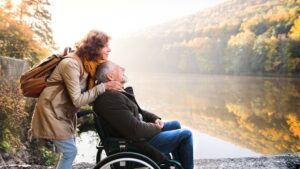
How to Spot Elder Abuse
Did you know that there are 5 million cases of elder abuse reported each year? That number may astound you because abuse of any kind should not be the norm. Abuse comes in many shapes and sizes and sometimes can go unnoticed by family members and friends. Sometimes the abuse comes in stolen funds, neglect, or can be done verbally. Whatever the case may be, the goal is to bring awareness to the abuse so that it can be stopped.
How to spot elder abuse:
- Physical Abuse
- Verbal Abuse
- Financial Abuse
- Neglect
Physical Abuse
Does your loved one have unexplained bruises, burns, or broken bones? Are you receiving odd reasoning for the marks? If so, your loved one may be experiencing elderly abuse by their current caretaker.
Verbal Abuse
Is your loved one withdrawing or beginning to feel nervous and fearful? They may be experiencing verbal abuse when you are not around. Since verbal abuse can be hard to pin down due to the fact that your loved one may have an illness that is affecting their memory, they are unable to fight back. Verbal abuse can be found in phrases like, “Taking care of you is ruining my life.” or unnecessary cursing or yelling.
Financial Abuse
Is your loved ones credit card being used more than normal? Are bills not being paid? Are unusual purchases arriving on the porch from online shopping? If you are noticing unusual activity taking place, your loved one may be experiencing financial abuse. If you hired a caregiver or a family member to watch over your loved one you should always request that receipts be kept and shown for each purchase.
Neglect
Depending on their current health, some elderly may be unable to take care of themselves. Due to these health factors, it is important that you are checking in to check for dirty clothes, bed sores, and unusual messes to see if the one who is watching over your loved one is taking the time to care for their needs.
We hope we provided enough information about how you can spot elder abuse! Always remember that if you spot elder abuse happening don’t be afraid to call the national help hotline or visit their website to learn more: https://ncea.acl.gov/resources/state.html. Also, if you don’t feel qualified or able to take care of your loved one, we can help. To learn more about our assisted living, long-term living, or rehabilitation services, be sure to give us a call at (937) 319-8924.









